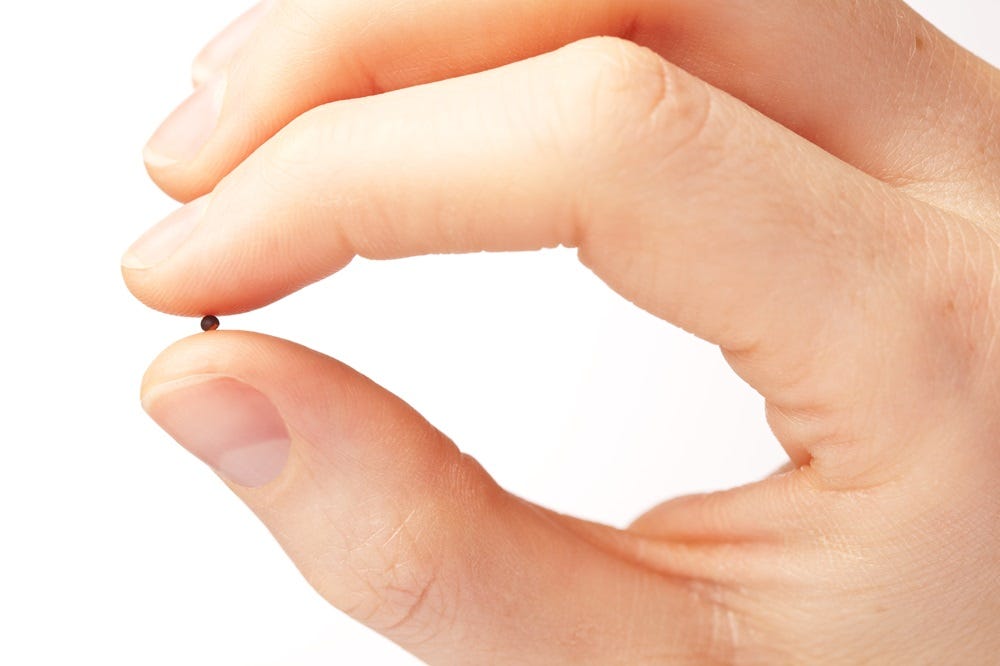A Kernel of Faith Is All It Takes
How much faith is required for healing prayer to work? Less than we might think.
A mustard seed.
I spent most of this past week suffering from fairly bad back pain. I had experienced pain in my back before, owing to a sedentary job and several hours per day spent in front of a computer, but this was different. It was like the muscles in my back were trembling. Standing up felt like a workout. I consider myself to have a fairly high pain tolerance, due to years of martial arts training, but at multiple points I had to stop work and lie down in the hope that that would make my back muscles stop shaking.
On Thursday I lay down midway through the morning, hoping the pain would pass. It didn't. My wife checked in on me after an hour, and I asked her to pray over my back.
She did, beseeching God to heal my muscles and to take away the pain. I prayed too. She's good at this kind of stuff (how you can be be good or bad at healing prayer is something I'm still trying to wrap my head around, but she's very good), and I hoped her prayer might do something.
After she finished praying and left, I had the following conversation with God.
Me: "God, I'll be honest. I don't think you're going to heal me. And it's not because you can't or you don't love me; it's because there's something in me, some wall of unbelief, that will prevent you from healing me."
God: "My son, thank you for your honesty. (Pause) Are you at least willing to test it?"
Me: "Sure, I guess."
At that point, I fell asleep for about fifteen minutes. When I awoke I got up and went to work. I thought about the piece I wanted to write that day, about a new client, about the story I'm writing, about the two books I was reading.
It took me a couple of hours to figure out that I was no longer thinking about my back. And the reason was simple: when I paused to notice, I realized that the pain was gone. The trembling and feelings of weakness had passed. My back had been healed.
It wasn't just the placebo effect, either. The first four days of this week were rough. I could barely function, and I got very little real writing done. After my wife prayed over me, the pain went away. It's largely stayed away for the past three days.
But what I find really interesting isn't the power of healing prayer. I've seen that before (there's a reason that I know my wife is good at this kind of thing). What I find fascinating is how willing God was to move even given my own relative unbelief.
I think sometimes we can get caught in the trap of thinking that God is a joyless scold forever looking down at us, always disappointed in our lack of faith. No matter how devout we want to be, there's always a kernel of doubt, and I think that sometimes we can trick ourselves (or get tricked) into thinking that that kernel of doubt will be enough to make God pull His favor from us.
But my experience has been the opposite. I experience God, not as a joyless scold forever disappointed in my inability to clear a high bar, but as a loving parent delighted with my most meager jumps. As C.S. Lewis writes in Mere Christianity, while God wants to make us perfect, He "will also be delighted with the first feeble, stumbling effort you make tomorrow to do the simplest duty." Lewis quotes George MacDonald: while "no father would be satisfied with anything less than a firm, free, manly walk in a grown-up son," it's also true that "every father is pleased at the baby’s first attempt to walk."
Or as Jesus says, “I tell you the truth, if you had faith even as small as a mustard seed, you could say to this mountain, ‘Move from here to there,’ and it would move. Nothing would be impossible.” (Matthew 17:20, NLT).
Even though I had immense and self-flagellating doubts about whether or not God would heal me, that tiny kernel of faith—"sure, I guess"—turned out to be all that God needed.
That's pretty cool.
Heal the West is 100% reader-supported. If you enjoyed this article, please consider upgrading to a paid subscription or becoming a founding member. I greatly appreciate your support.


